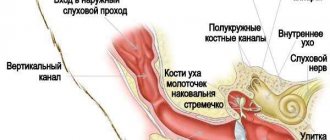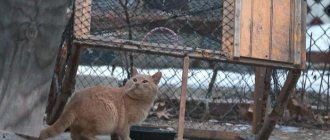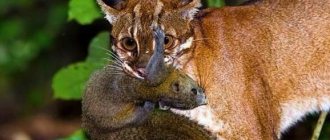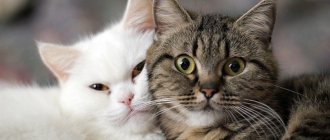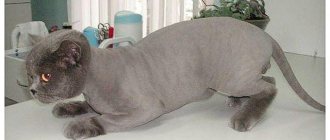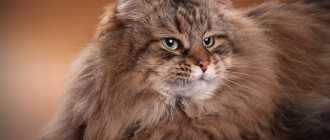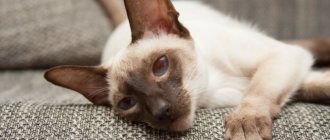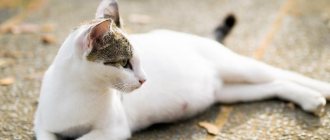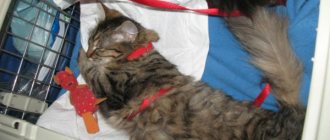Cats and bird hunting
Cat lovers have a hard time accepting that adorable cats are responsible for the decline of fauna and birds around the world, as is the case with pigeons or sparrows, but also with endangered species.
Although this is very typical behavior for this type of predator, it is important to know why cats hunt birds and what the real consequences of this type of behavior are. In this article “Why do cats hunt birds?”, we will try to find a solution to your doubts. Let's continue reading together.
The Tale of the Cat and the Rat
Has anyone ever thought about why cats don’t like mice and rats so much? Or you can say even more - he sincerely hates them? The answer to this question can be found in a Madagascan fairy tale. So the rat and the cat set off on a long sea voyage. The path ahead was not short, so the cat quickly got tired of such monotony, and he began to pester the calmer rat with his reproaches and nagging. The rat tolerated the cat for a long time, but she also began to slowly get tired of such monotonous swimming, so in order to somehow occupy herself, she began to gnaw on the ship's ropes, which were smeared with lard.
After the rats' teeth, the ropes became much thinner, so they could not withstand a strong storm and broke, as a result of which the animals almost died. The cat, seeing the damaged ropes, realized that it was the work of a rat, so he decided to simply eat it when the ship moored to the shore. The rat guessed about such unfriendly intentions, at night gnawed through the ship's plating and began to swim to the shore.
The cat jumped into the water after the rat and tried to catch up with it. Alas, he was a poor swimmer, so he almost drowned. But I still reached the ground. It was from this time that cats cannot stand rats and mice and try to destroy their tribe to the last mouse.
Why do cats hunt pigeons and other birds?
Cats are carnivores by nature and hunt primarily for food and survival. This is the mother who teaches the kittens how to hunt, a teaching that we can find especially in wild cats. So, beyond the education they have received, cats test their hunting skills even when they are not hungry.
It is for this reason that even if a cat lives in a place where he is cared for and offered food, he will always show a strong impulse to hunt, which will help him learn speed, strength, distance and pursuit.
It is quite common for mothers to offer their dead sacrifice to their kittens. The reason why many neutered cats transfer dead animals to their owners is mainly due to the cat's maternal instinct. Based on studies of cat prey in the wild by Michael Woods, Robbie A. McDoland and Stephen Harris, which were implemented in 986 cats - 69% of prey hunted were mammals and only 24% were birds.
My cat hunts, but does not kill prey. Why?
Contents hide
My cat hunts, but does not kill prey. Why?
Cats are excellent hunters by nature. Now we are talking about those cats that live with their owners in private households. As a rule, they have rich and varied leisure time. Cats enjoy hunting for rodent pests - mice and rats. But the question remains open: what is the ultimate goal of the hunt? Foraging? A game? Mischief?
“Mouse as a gift” is a phenomenon that many cat lovers encounter. On the one hand, it’s nice when a cat brings (“shares”) its prey to its owners. On the other hand, what form is this prey in? I speak about this with knowledge of the matter. An old grandmother lives in our village. Her faithful companions in life are two cats - Tishka and Red. Cats are haters of rodents, but... They do not always finish off their prey. Sometimes they simply “strangle”. Sometimes they are wounded and left in such a completely “inhumane” form. Moreover, they throw it to the grandmother in this form - they say, look, it’s not in vain that we eat our bread. Grandma was used to such a sight. But when one of the victims “came to life” right before the eyes of my mother-in-law, a scene occurred worthy of the pen of a great writer.
Cats and hunting. It's only natural that cats love to hunt. The kittens are taught hunting skills by their own mother. She often brings a “strangled” mouse into a box for the kids and shows “in practice” how to properly kill the prey. Therefore, when you read in an advertisement “Kittens from a rat-catcher cat,” you should know that the kids have also already been taught the basics and rules of hunting.
An interesting question: why do domestic cats hunt? After all, there is always food for them, stored by the owners. We will answer this way - the power of instincts inherent in nature. Cats hunt because “they have to.” It’s simply impossible to do otherwise.
Why does the loot come into the house? First, we note that this does not always happen. It also happens that caught rodents immediately go for lunch or dinner. Secondly, the reasons for bringing prey into the house vary from cat to cat. Why, in fact, did the owners decide that this was a gift for them? Let's turn to the behavior of wild cats: yes, they can eat prey on the spot when they are very hungry. But most often they drag her to their lair to dine in comfort and safety.
Of course, let's not discount the fact that the cat wants to show off its trophies - that's what kind of hunter I am! As noted above, the mother cat brings the mice home as a “training aid.”
But, whatever the real reasons, we will proceed from the following. A cat is a predatory animal, and a mouse is its lawful prey. Animals do not tolerate competitors for prey. And if the prey is shown to the owners without fear, it means that the cat considers them part of its own family. Or considers himself part of one. There is no other option.
But why is the prey sometimes alive? Again, several reasons. Perhaps the cat remembers its mother and the first lessons learned from her. In you, she sees an incompetent fool, unable to deal with an ordinary mouse. You need to be taught this art!
Some cats bring live mice “just because” for collection. The natural instinct is satisfied - the rodent is caught, the prey is at the mercy of the predator. But eating such prey is not at all necessary - its gastronomic value is very doubtful. The house is full of all sorts of delicious things. And let the mouse come to its senses and run on about its business.
It happens that cats are attracted to the process itself. They hunt “for fun”; for them, hunting is not an end in itself, but an element of the game. The impudent rodent squeaked - the cat would perk up, catch up and catch it. And... he quits halfway through. Mission accomplished! And interest in mining immediately fades away. By the way, there are a lot of funny videos on this topic on the Internet. A cat catches a mouse, which falls into a deep faint from excess of feelings or pretends to be dead, and that’s what happens.
Everything in the natural world is too complicated!
Photo: pixabay.com
Are cats really responsible for the extinction of some birds?
It is estimated that domestic cats kill about nine birds a year, which may seem small when just one cat is considered, but becomes significant when the total number of cats in the country is considered.
Cats have been classified as a predatory species by the International Union for Conservation of Nature because they have contributed to the extinction of 33 bird species worldwide. Below is a list of birds that have become extinct:
- Campanaro from Chatham (New Zealand)
- Bowdleria rufescens (New Zealand)
- Rallo delle Chatham (New Zealand)
- Caracara Guadalupe (Guadalupe Island)
- Frosone delle Bonin (Ogasawara Islands)
- Coenocorypha barrierensis (New Zealand)
- Golden Woodpecker (Guadeloupe Island)
- Macquarie Parakeet (Macquarie Island)
- Choiseul Pigeon (Solomon Islands)
- Spotted Tou (Guadeloupe Island)
- Polluela Hawaiian (Hawaii)
- Bleaching or laughing guillemot (New Zealand)
- Reyezuelo de Bevic (New Zealand)
- Traverse Lyally (Stephens Island)
- Turnagra Capensis (New Zealand)
- Bush Wren (New Zealand)
- Tortora di Socorro (Socorro Island)
- Zoothera terrestris (Bonin Islands)
As you can imagine, the extinct birds all belong to different islands where there was no cat presence. And on these islands, the local habitat is much more fragile. Moreover, all the birds mentioned earlier went extinct in the twentieth century when European settlers introduced cats, mice and dogs directly from their countries of origin.
But it's also important to note that most of the birds on this list have lost the ability to fly due to a lack of predators, especially in New Zealand, and this has made them easier prey for felines and other animals.
Happy hunting. A story from the life of a domestic cat
When Tanya brought the little fluffy ball into the house, they looked at it for a long time and carefully. There was no limit to delight! There was a charming lady in the box. With huge expressive eyes, the color of which was impossible to understand: either blue or blue-gray. The cat's color is black; there is a white spot on its face above its nose. Snow-white shirtfront on the chest. The front paws look like light slippers, and the back paws look like boots. The tip of the tail also remained white.
The couple, without thinking twice, named the fluffy cat Baska. From the old Russian word “basko”, which in the old days meant beautiful and handsome.
Carefully guarding the property from the encroachments of strangers, the beautiful lady became a full-fledged mistress from the first months of her life in the house. One cool summer evening, she quietly crept into the middle of the kitchen and froze for a moment. She sat on her hind legs and tucked her front legs under her stomach. The back arched. Raising her head, Baska carefully looked at one point. Between the stove and the partition lay logs brought from the street, and someone was moving in them. The kitty moved a little to the side and sat down on her hind legs by the bench with buckets.
The owners were going to have dinner, but when they saw the hunt beginning, they decided to help. Nikolai stood up, walked up to Baska, silently rearranged the buckets, and then the bench. Tatyana carefully, so as not to frighten off the uninvited guest, began to remove one log at a time. Having rearranged several rows, the woman noticed with amazement that in the very middle a small gray head with tiny flattened ears, long mustaches and huge frightened eyes was sticking out. Little mouse!
For several seconds Tatyana and the mouse looked at each other motionless. Then the hostess, holding a log in one hand, silently turned and showed Baska with the finger of her free hand that the enemy was here. The mouse was located above the cat's eye level. She couldn’t see how the little coward became silent, hiding, as if in a deep gorge, in a recess formed between loosely stacked logs. The silent pause dragged on.
Suddenly something loudly cracked on the street. From the deafening sound, the mouse jumped out of its hiding place, Baska jumped and quickly rushed after him. The mouse either climbed under the bed with lightning speed, then rushed headlong back to the kitchen, then, running around the leg of the kitchen table, quickly rushed past the sofa and flew under the bed again.
It is impossible to count how many such circles were made. Baska chased the enemy until he ducked into a crack between the wall and the floor. Then the huntress, exhausted and annoyed by her failure, leaned over the crack and began to wait patiently.
Tanya came down... from the table, which, without remembering herself, she had climbed onto when the hunt began, and only now she noticed plates that had fallen from the table on the floor, two of which were broken. Kolya was standing on the sofa in the room - he hurriedly jumped on it right in his slippers.
The husband, returning to the kitchen, helped clean up, and when order was restored, he asked:
- What will we do if Baska doesn’t catch the mouse?
“We’ll live together in harmony,” Tatyana exclaimed and lightly patted her husband on the shoulder. - I have to go to work.
Tanya began putting a package of crackers, a pack of tea, and a chocolate bar into her bag, saying:
“I’ll nibble on crackers so I don’t want to sleep, and I’ll drink tea with chocolate.” Until the morning, time apparently sleeps and moves very slowly.
When his wife went to work, Nikolai began to watch TV until he fell asleep on the sofa.
The next morning, when Tatyana returned home, she found a puzzled Nikolai. Apparently, the cat continued the hunt at night. But it turned out that the white mouse jumped into the cage where the hamster had recently lived. It is unclear how the door to the cage was closed, but the uninvited guest felt quite comfortable in it. Baska sat nearby and purred loudly, as if saying:
- Look! This is my first successful hunt!
There was a soft knock on the door. Tanya hastily opened it. A neighbor came in:
- Excuse me, did a mouse accidentally run into you?
- White? - Kolya clarified.
- White. Yesterday my grandson decided to let the little mouse out on the grass in the yard. Before he could turn away, he disappeared. They searched all evening, but never found the fugitive.
“And in the dark the mouse seemed gray to me,” Tatyana laughed.
- So you saw him?
“I thought I had a good look yesterday.” It turns out I was wrong.
- Where is our favorite now? - the neighbor asked impatiently.
“The hamster is living in a cage under the protection of Baska,” Nikolai clarified.
— How under protection? Why in a cage? What happened to the mouse?
Nikolai went into the room and returned with a cage.
- Thank you very much! From me and from my grandson! — the delighted neighbor often said.
- It’s not us who are grateful - Baska.
Oh, I got a bird
Bird hunting is not an easy task for a cat!
However, among cats there are even some intellectuals who cannot stand the smell of mice, preferring to feast on birds. And they succeed!
It turns out that catching a mouse costs a cat almost nothing. It's a bird! That one's eyes are positioned in such a way that you can see what is behind. If a cat can still grab a gaping bird located on the ground, then there is nothing to think about catching prey sitting on a tree. True, you can sometimes walk through bird nests.
Mustachioed fishermen
It's no secret that some cats are professional fishermen. They can sit on the bank of a pond or river and carefully lie in wait for a careless fish. True, for this the cat needs to psychologically overcome its innate dislike of water. But the goal is worth it! Some gourmets are ready to lay down their own cat's soul for fresh fish.
I remember an incident in my distant childhood. When, while visiting relatives in Ukraine, we went fishing in the pond, which was right behind the gardens. The owner's cat followed. My father and I sit on the bank, pull small crucian carp out of the water and put them in a can of water.
After some time, the father turns around and sees that the can is almost empty (in the sense that there are two fish there). As it turned out later, this same cat was waiting for us to put the next crucian carp into the can, sneaking up, with incomprehensible dexterity, put his paw there up to the shoulders and with his outstretched fingers felt for the rushing crucian carp in the water. Then he strung it on a claw, cut it short and threw the prey behind his back onto the grass, where he destroyed it in a matter of seconds.
